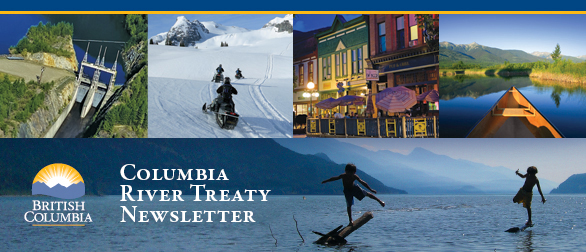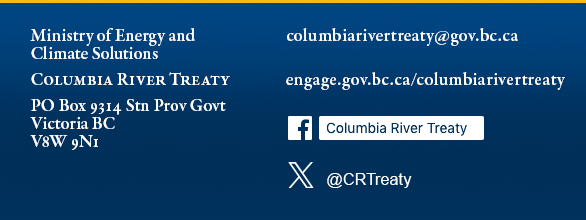Columbia River Treaty
Edition: May 2020

Columbia River Treaty Heritage Project and Addressing Community Interests
May 28, 2020
During the Province’s Columbia River Treaty community meetings, which began in 2012/13 and continued in 2014, 2018 and 2019, residents and Indigenous peoples shared how implementation of the Columbia River Treaty impacted Columbia Basin people, communities and the environment. They felt these impacts and the losses resulting from the Treaty dams should be acknowledged in some way.
In April 2019, the Columbia Basin Regional Advisory Committee brainstormed ways to address this acknowledgement. One of those ideas is now under development: the Columbia River Treaty Heritage Project (CRT Heritage Project).
The CRT Heritage Project is a proposed touring route that links a series of information stops at key locations throughout the entire Columbia Basin. The information stops communicate Indigenous and non-Indigenous place-based stories of impacts and losses due to Columbia River Treaty implementation. Basin communities will be consulted and will decide which stories they want to include in the project and how those stories will be expressed. A marketing campaign will focus initially on B.C., and later Alberta and U.S. states impacted by the Treaty.
Direction for the project is provided by the CRT Heritage Project Steering Committee. The committee is composed of Columbia Basin heritage and tourism professionals, Indigenous Nations representatives, a local government representative and staff from B.C. government heritage, tourism and development agencies.
From February to April 2020, a consultant team communicated with Columbia Basin stakeholders to gather information for a detailed project plan needed to support applications to federal, provincial and regional funding programs. Consultant funding was provided by Community Futures East Kootenay and the Ministry of Energy, Mines and Petroleum Resources.
Once funding and a project team is in place, community consultations will begin, and heritage content and delivery will be developed. This work is planned for late 2020 and 2021. Questions about the CRT Heritage Project, can be sent to Ingrid Strauss at Ingrid.Strauss@gov.bc.ca
Other Community Interest Projects
The Province is exploring domestic solutions for several other issues raised by Basin residents throughout its public consultation on the Treaty.
Nakusp Marina and Breakwater: In March 2020, the Ministry of Energy, Mines and Petroleum Resources provided $30,000 to the Village of Nakusp to undertake engineering and preliminary work to address the deterioration of the marina and breakwater. An engineering survey and work on the first phase of breakwater replacement is underway.
Arrow and Kinbasket Reservoir geospatial mapping products: Working from aerial imagery of the reservoirs, donated by BC Hydro, the Ministry of Energy, Mines and Petroleum Resources is developing geospatial mapping products, including digital elevation models, for the Indigenous Nations Columbia River Treaty ecosystem working group. These products will also be donated to Selkirk College for the Columbia River Treaty portal the college is developing as part of their Rural Open Data project.
Creston Valley Dikes: In October 2019, the Ministry of Energy, Mines and Petroleum Resources hosted a diking workshop to provide regulatory and funding information and initiate discussion among Basin stakeholders on issues and solutions. This was followed by one-on-one meetings with key stakeholders. A follow-up workshop planned for April 2020 has been postponed until fall.
The B.C. Treaty Team will continue to work with residents, local governments and specific interest groups on these and other domestic-solution issues, and will provide updates to the public as progress is made.


